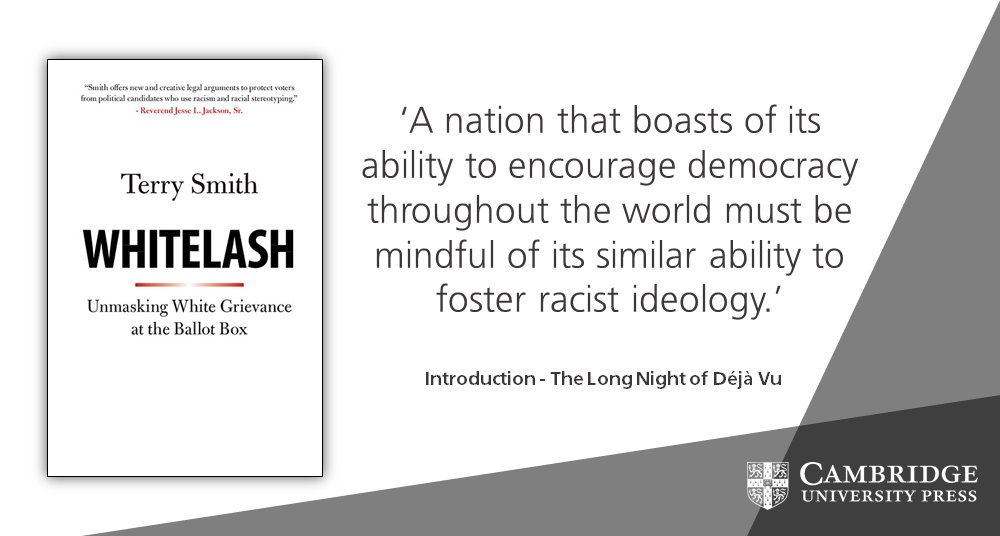
Whitelash: Unmasking White Grievance at the Ballot Box
by Terry Smith, J.D.
published by Cambridge University Press
2020
This is a very thoughtful book that I began zealously recommending to others as soon as I was a few chapters in. Written by a law professor, this text analyzes the actions of the Trump Administration and motivations of its supporters, and asks: is the overt racism displayed by the administration and its primarily white supporters legal, and can it be addressed within existing legal frameworks?
Aside from me: For anyone who wasn’t in the US or following news in late 2016, the election of a failed businessman over an experienced and successful female secretary of state is best understood as a reaction by conservative white voters against the party and policies of the twice-elected African American president. While the US has a mythology of cultural openness and racial inclusion, this mythology is usually limited to justifying structures of white dominance with minor multi-cultural visibility. It appears from interviews and studies (included many cited in the footnotes of Smith’s book) that a black president made many whites feel that their unearned dominance was ending, and so they chose a leader with animus against a range of non-white ethnic groups with hopes to re-entrench whiteness as the center of political power and as the only true American identity.
Mr. Smith’s definition of a white backlash, condensed to Whitelash, is very clear:
Whitelash is the reaction of many white Americans when they believe that strides toward racial equality have run amuck, to the point of threatening their own material well-being, even as they remain far better-off economically than people of color…. This fear manifests itself through individual and collective efforts to retain the benefits of a structure of racial inequality, efforts that erroneously cast equality for people of color as discrimination against whites. Thus, the default position—the social baseline—from which too many whites define the normalcy of race relations is racial inequality.
from Whitelash Chapter 1, Electing Trump and Breaching Norms
With an extensive background in civil rights law and discrimination cases, Mr. Smith finds that in most circumstances, the stated intentions of the administration, which displayed clear animus against specific groups, would be legally actionable. From housing rights to employment to labor law and beyond, an announced intention to “ban Muslims” would put DT on the wrong side of the law. The racial animus that animates his followers is harder to legally address, but Smith ultimately proposes common sense solutions to cancel out the local manipulations of racists, which currently roll up to have adverse national impacts for all of us.
Smith’s analyses are methodical and well supported with citations to source materials. As a legal professional, it is what I would expect in my profession and in legal education more than in the popular, general-audience press. The writing is clear, and the explanations of the law are superb, and there are great citations!! (The Apple ebook version has each footnote linked in a way that makes it easy to read them and jump back to where you left off reading. I also appreciate the many colors of highlighting in the Books app, which I utilized extensively. I’m sure other eBook software has similarly beneficial features, but this is the first time I really utilized them, and it made a great impression.)
Thanks to Smith’s thorough research, the book goes beyond law and features many amazing quotes and references to other worthwhile books that delve into some of the topics covered. For example, while so many of us can’t understand how voters could sabotage material improvements for all of us, or even vote against policies that would benefit them directly, content Smith cites suggest that people’s idea of themselves as conservatives wins out emotionally over their own specific material situation.
“ In 2004, Emory University political psychologist Drew Westen conducted neuroimaging of the brains of partisan men presented with evidence that both Democratic presidential candidate Senator John Kerry and Republican incumbent George W. Bush had made contradictory statements. Democrats were more critical of Bush’s statements, and Republicans were more critical of Kerry’s. The neuroimaging revealed that the portion of the brain associated with reasoning—the dorsolateral prefrontal cortex—played no role in eliciting the partisans’ responses to the candidates’ statements. Instead, the emotion circuits of the brain lit up when the subjects responded.”
(emphasis mine)
This helps me understand why people would vote against getting life-saving healthcare, for example – their political self-image has no room for such things, and their emotional fears of not being first in line, or of anything good happening for people who look different from themselves, kills such support outright. (You can see this in discussions of the national healthcare program: people whose lives were saved by “Obamacare” have spoken out to say they had opposed the idea on principle, while others said they opposed “Obamacare” but supported the “ACA,” – even though they are the same thing. One label offended their political identity.)
It can be painful to relive some of the terrible, racist actions, statements, and policies that were made during the time period covered, but it is also useful to see these actions against non-white and non-Republican groups as part of a long term pattern and strategy (with source citations!), rather than in the outrage-of-the-day coverage that we had at the time.
In summary: this is the best book I’ve read on the topic of political racism and its impacts in the United States. With a wealth of citations, clear writing, book recommendations on related topics, and a thoughtful and logical approach to analyzing the pretexts under which racism operates, I feel enriched by having read it. I feel even more confident in my support for necessary democratic reforms than I previously did. I highly recommend it.
